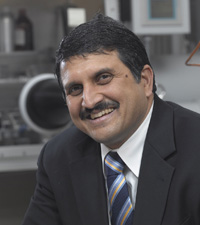
Edward R. Weidlein Chair Professor
Swanson School of Engineering and School of Dental Medicine
Department of Bioengineering
Department of Chemical and Petroleum Engineering
Department of Mechanical Engineering and Materials Science
Department of Oral Biology
849 Benedum Hall
University of Pittsburgh
Pittsburgh, PA 15261
Telephone: (412) 648-0223
Fax: (412) 624-8069
Education:
B.Tech. (Honors) Metallurgical Engineering, Indian Institute of Technology, Bombay, India 1984;
M.S., Materials Science and Engineering, University of Arizona, Tucson, AZ, 1987;
Ph.D., Materials Science and Engineering, University of Arizona, Tucson, AZ. Advisor: Subhas
H. Risbud, Department of Chemical Eng. and Materials Science, U.C. Davis, 1990
Professor Kumta's research interests cover the two broad areas of Energy storage and Biomaterials. The main focus of research in both these areas is to develop novel low temperature approaches and study the relationships of the process parameters, the ensuing microstructure and crystallographic structure to the electrochemical activity in the former and biological response in the latter. Current research in the energy storage area has been directed towards understanding the theory of solid-state materials using first principles methods while developing novel low temperature chemical, mechano-chemical and thin film approaches to synthesize nanostructured particulate and nano-layered thin film architectures for lithium-ion applications. Research has also been conducted to develop indigenous low temperature sol-gel and template approaches for the synthesis of nanostructured particles and nanotube electrocatalysts for direct methanol fuel cells. In the Biomaterials area, research is focused on developing novel low temperature metastable approaches under physiological conditions for the synthesis of biocompatible ceramics useful in non-viral gene delivery applications. Another important aspect of the Biomaterials research program involving strong interaction with the University of Pittsburgh is to study the role of bio-ceramics and genetically engineered proteins for engineering and design of new biomaterial interfaces and morphologies used to investigate stem cell plasticity.
Resume

